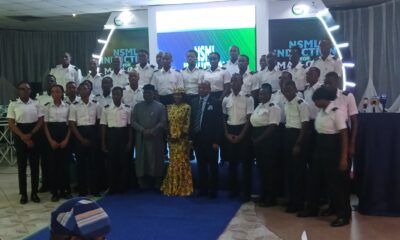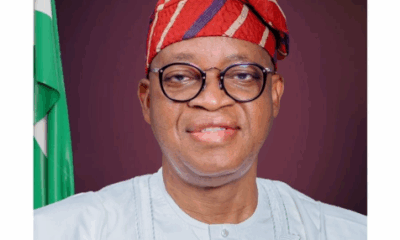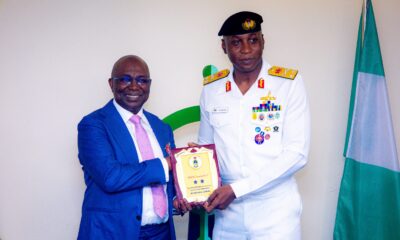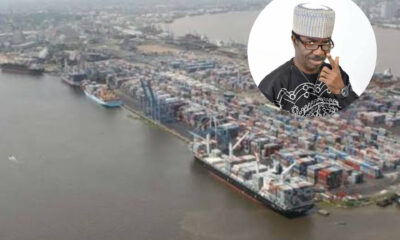Maritime
Terminal Corruption: Inside the Collapse of CRFFN and the POF Scandal

The Council for the Regulation of Freight Forwarding in Nigeria (CRFFN) stands on shaky ground. Once envisioned as the torchbearer of professionalism in Nigeria’s freight industry, it now finds itself engulfed in a swamp of allegations – ranging from corrupt revenue collection practices to ministerial coercion and total regulatory breakdown.
At the heart of the implosion is the Practitioners Operating Fee (POF), a mandatory levy charged to freight forwarders since 2019. But behind its noble mission lies a trail of unaccounted billions in unremitted dues, and a technological partner now facing widespread accusations of fraud.
Eguono Odjegba in this report examines agitations for the continued relevance of the CRFFN in the light of various, procedural, operational and administrative conflicts between it and it’s constituent members the confusion it has thrown up following a recent court judgement restricting it from the collection of POF from licensed customs agents.
A Collection System or a Black Hole?
SW Global, the firm contracted to collect POF revenue, was expected to bring transparency and accountability. Instead, what emerged was a cash flow that no one could fully trace.
Key allegations include:
- Billions of naira collected over six years with no clear remittance to CRFFN or freight forwarding associations.
- A revenue sharing formula that was abandoned in practice—leaving declarants empty-handed.
- CRFFN’s own Registrar admitted the council does not know how much has been collected.
Despite repeated payments by freight agents and associations, not one kobo has reportedly been returned to stakeholders as agreed. Freight forwarders like Mr. Emenike Nwokeoji (ANLCA) and Mr. Stanley Ezenga (NAGAFF) confirm zero payouts – either as individuals or representatives of their unions.
Behind the Curtain: A Contract That Outlived Accountability
SW Global’s long-standing contract, awarded without competitive bidding renewal or audit transparency, enabled unchecked control of revenue collection.
- Freight agents allege deliberate opacity, with no data reconciliation between CRFFN and SW Global.
- Even associations tasked with oversight say they’ve been stonewalled in their attempts to access basic financial records.
Former ANLCA official Babatunde Mukaila revealed his company is owed over ₦5 million in refunds – an amount backed by verified payment data. Yet CRFFN has offered no path to recovery or restitution.
Ministerial Coercion and the Policy Push

In the past four years, there has been a number of shady ministerial interferences bent of overiding the due process in both the political leadership of the CRFFN and the expenditure of its revenue carved in 3-prong sharing formula.
According to leaked correspondence and stakeholder accounts, the approval of the POF scheme in January 2020 by then-Minister of Finance, Hajia Zainab Ahmed came after pushback from the Nigerian Shippers’ Council (NSC), which initially warned of its economic impact, before being sucked in by Abuja.
One of such ministerial actions was the appointment of Mr. Kingsley Igwe as CEO of the CRFFN, which four out of the five Accredited Associations opposed, and followed up with a court suit challenging the appointment. The case is still pending.
Critics argue the Ministry’s endorsement bypassed proper consultation and industry safeguards, effectively rubber-stamping a scheme primed for abuse.
The scheme projected up to ₦10 billion in annual revenue, yet to date, there is no confirmed record of its full earnings – or where the money has gone.
Consequences and Collapse: The Case for Scrapping CRFFN
Industry insiders now call for an urgent dismantling of CRFFN or a complete overhaul:
- The council has failed to regulate, failed to enforce transparency, and lost credibility.
- Freight forwarders argue that continuing the POF without remittance violates their economic rights and undermines trust.
- Ministerial influence, technical partner monopoly, and absent audits create a system designed to operate in the shadows.
CRFFN’s current Registrar, Mr. Kingsley Igwe, has hinted at terminating SW Global’s contract and rebuilding the framework. But stakeholders remain skeptical, questioning if reform within is possible – or if the council must be scrapped outright and rebuilt from the ground up.
The supervising Minister of Marine and Blue Economy, Adegboyega Oyetola has so far remained mute amid the ragging agitations.
From Reform to Reboot
The POF scheme was meant to professionalize Nigeria’s freight ecosystem. Instead, it exposed a blueprint for systemic failure. Unless decisive action is taken – including full forensic audits, prosecution of complicit officials, and institutional reform – freight regulation in Nigeria may remain a façade.
The questions now are clear: Who got paid? Who knew? And who buried the truth?




































